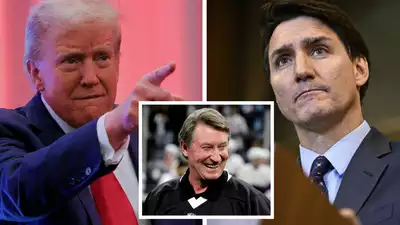As Justin Trudeau’s tenure as Canadian Prime Minister faces challenges, U.S. President-elect Donald Trump has stepped in with a surprising suggestion. On Christmas Day, Trump announced his unconventional choice for the next “Governor of Canada” – legendary hockey player Wayne Gretzky.
On December 25, Trump took to his social media platform, Truth Social, to share the news: “I just spoke with Wayne Gretzky, known in the hockey world as ‘The Great One.’ I told him, ‘Wayne, why don’t you run for Prime Minister of Canada – soon to be known as Governor of Canada. You’ll win easily. You won’t even have to campaign.'”
Trump continued, “Although Wayne isn’t interested, I believe the Canadian people should start a movement to nominate Wayne Gretzky. This could be exciting!”
Wayne Gretzky, born in 1961 in Ontario, Canada, is a renowned Canadian ice hockey player and an iconic figure in global ice hockey. Over his 20-season career in the National Hockey League (NHL), he became the all-time leader in goals, assists, and points, earning the nickname “The Great One.”
Gretzky is one of the athletes who has publicly shown support for Donald Trump. In November, he and his family garnered attention on social media when they attended a campaign event at Mar-a-Lago hosted by Trump, where they were photographed wearing “Make America Great Again” hats.
Reports indicate that Gretzky holds dual citizenship in Canada and the United States. He has a history of supporting conservative politicians, including publicly endorsing then-Prime Minister Stephen Harper and the Conservative Party during the 2015 Canadian election.
Trump’s endorsement of Gretzky’s candidacy coincides with a period of mounting pressure on Canada’s current Prime Minister, Justin Trudeau, to step down.
On December 16, Deputy Prime Minister and Finance Minister Chrystia Freeland abruptly resigned from the Cabinet, citing disagreements with Trudeau over handling the threat of U.S. tariffs and other issues.
On December 20, Justin Singer, a key Trudeau ally and leader of Canada’s New Democratic Party, announced plans to introduce a motion of no confidence against the Liberal government when the House of Commons reconvenes on January 27 next year. Should all opposition parties back the motion, Trudeau would be compelled to resign as Prime Minister after more than nine years in office, triggering a general election. Concurrently, an increasing number of Liberal Party lawmakers are advocating for Trudeau’s resignation.
Trump’s tariff threats against Canada are perceived as a factor that could expedite Prime Minister Trudeau’s removal from office. Opposition parties in Canada, along with members of Trudeau’s own Liberal Party, have criticized him for not taking sufficient action against Trump’s tariff threats.
Late last month, Trump threatened to impose a 25 percent tariff on all imports from Canada and Mexico to address illegal immigration and drug issues. Following this, Trump repeatedly suggested that Canada could become the “51st state” of the United States and that Trudeau could serve as its “governor.”
Pierre Polievre, the leader of Canada’s Conservative Party, remarked: “Ultimately, Trudeau is a weak leader who garners no respect globally. We should approach negotiations with our American counterparts from a position of strength—independent, strong, and proud.”
Canada’s Calgary Herald pointedly remarked that President-elect Trump implied the Canadian Prime Minister was not the leader of an independent nation, calling it “an almost unimaginable insult.”
